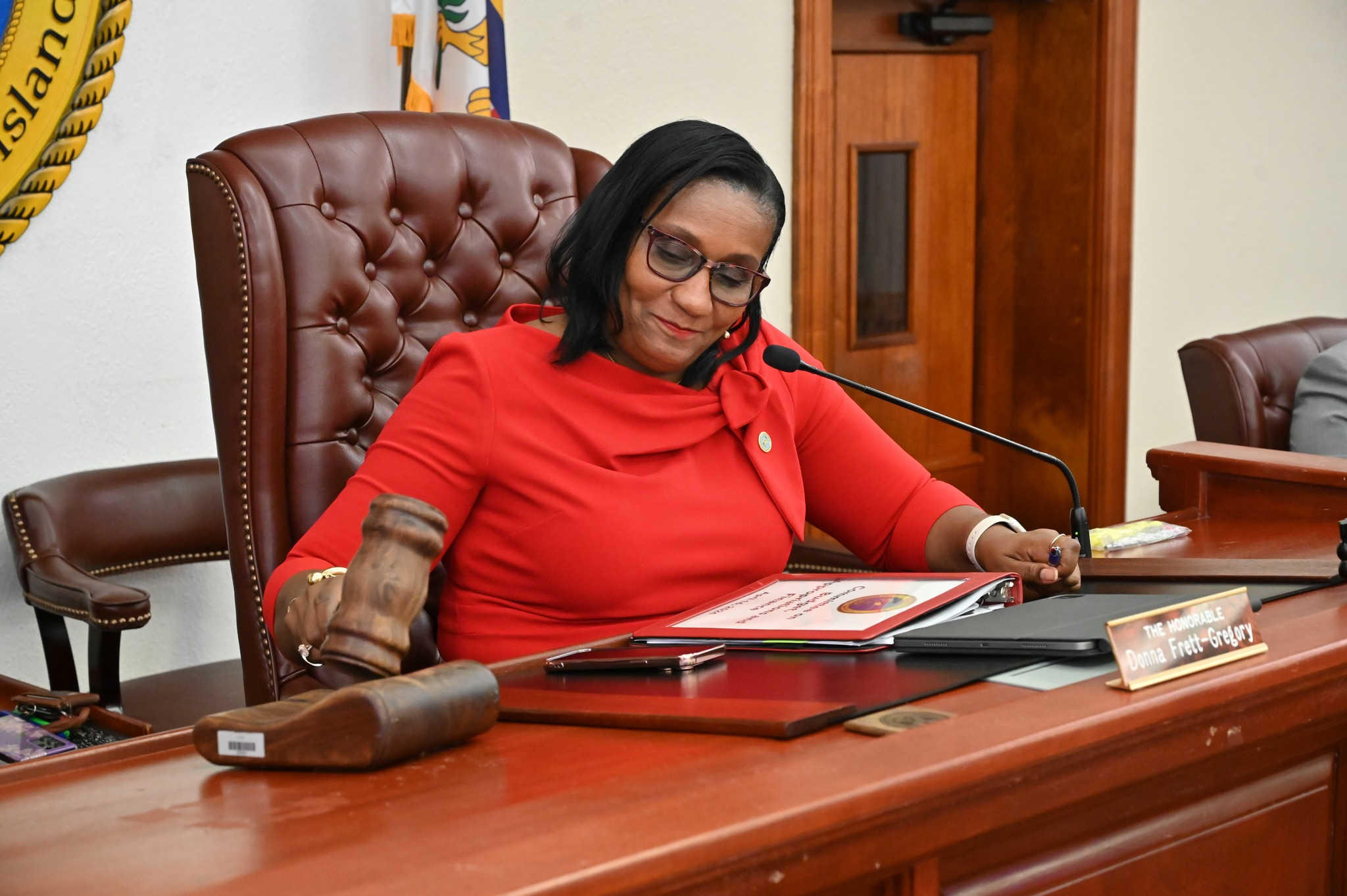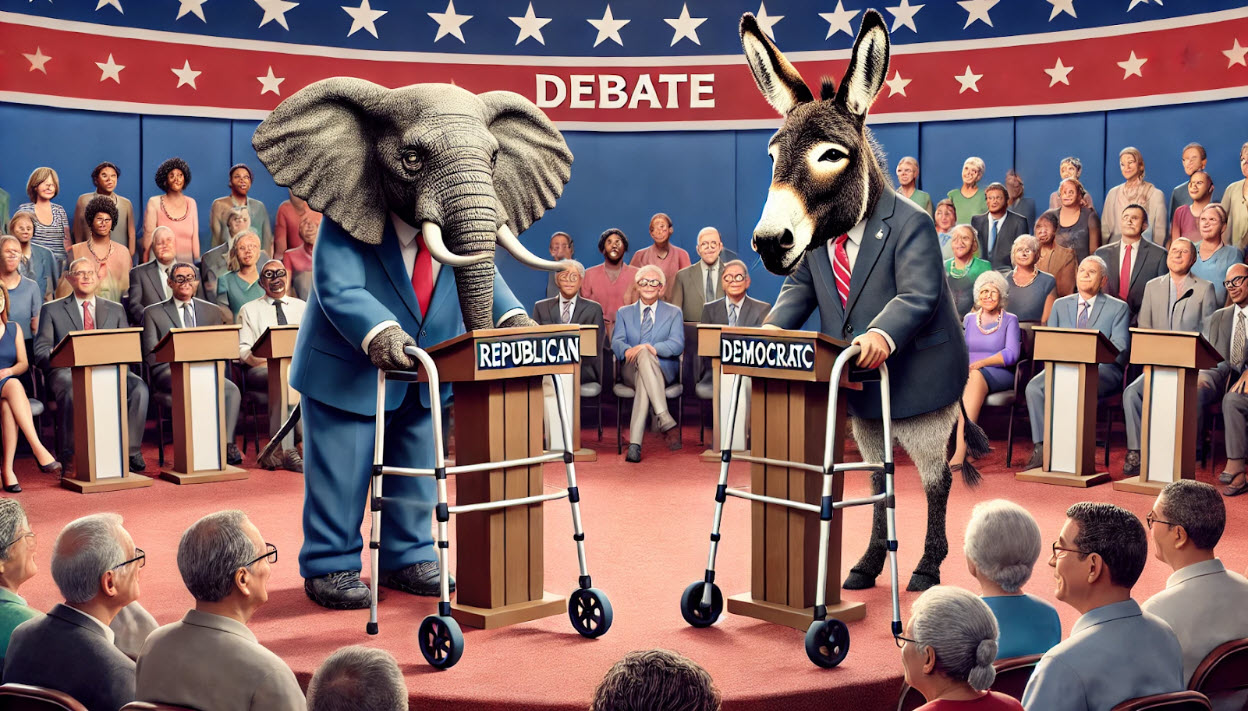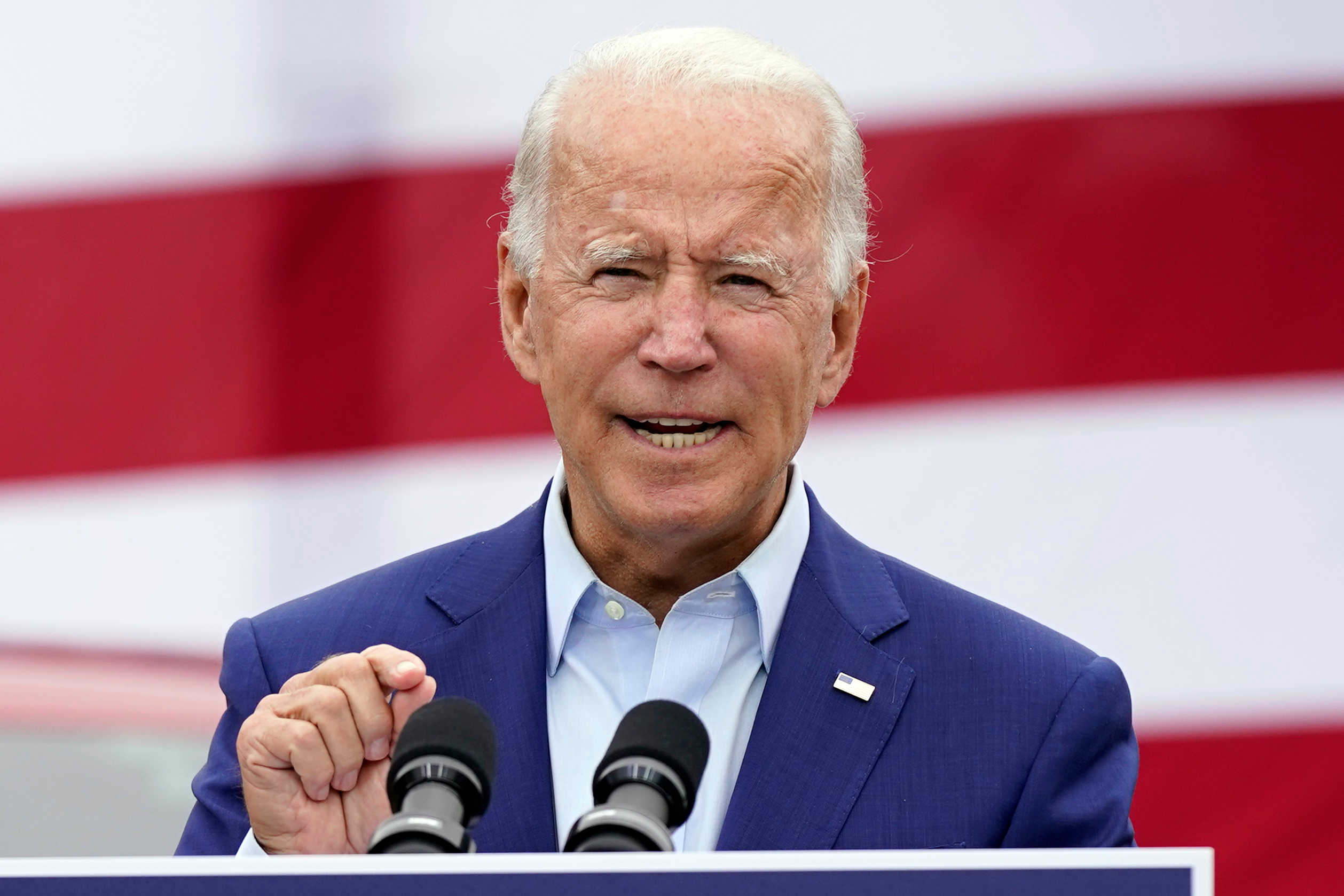Politics
Frett-Gregory Announces She Won’t Run for Re-election in 36th Legislature

Senator Donna Frett-Gregory has announced she will not seek re-election in the 36th Legislature. On Tuesday, the lawmaker revealed her decision not to run in the upcoming November elections.
This announcement makes Frett-Gregory the second member of the 35th Legislature to opt out of re-election. In March, Senator Javan James decided to leave elective politics to further his education.
Frett-Gregory disclosed her decision during a Committee on Budget, Appropriations, and Finance meeting, which she chairs. “I came to this decision after careful reflection and discussion with family members, friends, supporters, and constituents,” she stated. Her decision follows over thirty years of public service, including six years in the Legislature. “I know that now, I am ready to write a new chapter,” she added.
Even after her term ends in January 2025, Frett-Gregory intends to continue advocating for important causes. She has committed to being a “voice for accountability” and plans to remain active in public service. The Consortium has learned of her intention to run for governor in 2026, though she has not publicly confirmed this.
Known for her focus on financial issues, Frett-Gregory assured she will continue serving the people of the Virgin Islands in a different capacity. She plans to spend more time with her elderly mother and leverage her foundation to further contribute to society. “I am not leaving the people of the Virgin Islands,” she emphasized, addressing rumors about her potential gubernatorial bid.
Reflecting on her legislative tenure, Frett-Gregory expressed satisfaction with her accomplishments. She highlighted her involvement in creating a sustainable funding source for the Government Employees’ Retirement System, supporting victims’ rights, and securing funding for the Water and Power Authority, while insisting on oversight.
Senator Ray Fonseca praised Frett-Gregory’s “unique combination of skills and experiences,” calling them “extremely rare in the Virgin Islands.”
Frett-Gregory will continue to lead the 35th Legislature’s Budget, Appropriations, and Finance Committee through the upcoming budget cycle.

Politics
Presidential Debate Highlights: Biden and Trump Clash on Key Issues

Atlanta – In a historic debate held in Atlanta, Georgia, President Joe Biden and former President Donald Trump faced off in their first debate of the 2024 election season. Moderated by CNN’s Jake Tapper and Dana Bash, the debate covered a wide range of topics, including the economy, healthcare, foreign policy, climate change, immigration, and more. The event marked a significant moment as the current and former presidents engaged in direct dialogue, offering voters a stark contrast in their visions for America’s future.
Economy and Inflation
The debate began with a discussion on the economy and inflation, a top concern for voters. President Biden defended his administration’s efforts to lower prices and create jobs, citing the difficult economic conditions inherited from Trump’s administration. He highlighted the creation of 15,000 new jobs and 800,000 new manufacturing jobs, along with measures to reduce the cost of prescription drugs.
Former President Trump countered by claiming his administration had the greatest economy in U.S. history before the COVID-19 pandemic. He criticized Biden’s handling of the economy, particularly the inflation rates, and proposed a 10 percent tariff on all goods entering the U.S. to force countries like China to pay more.
Healthcare and COVID-19 Response
Healthcare and the COVID-19 response were heavily debated. Biden emphasized the importance of the Affordable Care Act and efforts to make healthcare more affordable, including reducing the cost of insulin. Trump criticized Biden’s COVID-19 mandates and healthcare policies, arguing that his administration’s pandemic response was effective and saved lives.
Foreign Policy and National Security
Foreign policy questions focused on handling relations with China and Russia. Biden discussed strengthening alliances and supporting Ukraine against Russian aggression. Trump criticized Biden’s foreign policy, asserting that his administration maintained better relationships with international leaders and kept the U.S. out of new wars.
Climate Change and Energy
Climate change and energy policies were another significant topic. Biden emphasized the need for sustainable energy policies and the creation of green jobs. He highlighted his administration’s efforts to rejoin the Paris Climate Accord and reduce pollution. Trump focused on energy independence through fossil fuels, criticizing Biden’s environmental policies as detrimental to the economy.
Immigration and Border Security
Immigration and border security were hotly contested issues. Biden defended his administration’s immigration reforms and efforts to secure bipartisan agreements. He emphasized humane treatment of immigrants and reduced illegal border crossings. Trump criticized Biden’s policies, advocating for stricter border controls and accusing Biden of allowing criminals to enter the country.
Gun Control and Second Amendment Rights
On gun control, Biden called for stricter laws to address gun violence while respecting the Second Amendment. Trump emphasized protecting constitutional rights and criticized Biden’s approach as overly restrictive.
Education and Student Debt
The candidates also discussed education and student debt. Biden highlighted his administration’s efforts to make college more affordable and support student loan forgiveness. Trump criticized Biden’s plans and proposed alternative solutions to address the rising cost of education.
Criminal Justice Reform
Criminal justice reform was another critical topic. Biden focused on comprehensive reforms to address systemic racism and achieve social justice. Trump criticized Biden’s record and proposed his own approaches to reforming the criminal justice system.
Economic Inequality
On economic inequality, Biden emphasized policies promoting fair wages and economic opportunities for all Americans. Trump advocated for tax cuts and deregulation to reduce economic disparity.
Supreme Court and Judicial Appointments
The candidates discussed their approaches to Supreme Court nominations and ensuring a fair judicial system. Biden stressed the importance of impartiality and fairness in the judiciary, while Trump emphasized appointing conservative judges.
The debate provided a platform for both candidates to outline their visions for the country, offering voters a clear choice in the upcoming election. With the stakes high and the nation deeply divided, the rematch between Biden and Trump promises to be one of the most closely watched elections in American history.
Read the transcript debate transcript at https://www.cnn.com/2024/06/27/politics/read-biden-trump-debate-rush-transcript/index.html
Politics
Biden and Trump Face Off in First 2024 Presidential Debate

ATLANTA—President Joe Biden and former President Donald Trump will take the stage tonight at 9 p.m. ET for the first presidential debate of the 2024 election cycle. The debate, hosted by CNN and moderated by Jake Tapper and Dana Bash, will be held at CNN’s studios in Atlanta, Georgia. This event marks a significant moment in the campaign as both candidates seek to define their platforms and sway undecided voters.
The debate comes after both Biden and Trump declined to participate in events organized by the Commission on Presidential Debates, breaking a tradition that has been in place since 1987. Instead, they agreed to a more controlled format on CNN, featuring strict time limits and microphone cut-offs to ensure orderly exchanges.
Tonight’s debate is expected to cover a broad range of topics, including the economy, healthcare, and foreign policy. With no live audience present, the focus will be solely on the candidates’ responses and interactions, devoid of the usual crowd reactions that can influence perceptions.
Biden, aiming to build on his incumbency, is likely to highlight his administration’s achievements, such as economic recovery efforts and foreign policy successes. Conversely, Trump, who continues to assert his influence within the Republican Party despite legal challenges, will focus on critiquing Biden’s policies and presenting his vision for America’s future.
This debate is the first of two confirmed face-offs between the candidates. The second debate is scheduled for September 10, 2024, and will be hosted by ABC News. The unique circumstances and altered debate formats this year reflect the evolving nature of political campaigning in the modern era.
For viewers, the debate will be broadcast live on CNN and simulcast across major networks including ABC, CBS, Fox, NBC, PBS, MSNBC, NewsNation, Newsmax, OAN, and Telemundo, ensuring wide accessibility.
As the nation tunes in, tonight’s debate promises to be a pivotal moment in the 2024 presidential race, offering a clear contrast between the two leading candidates vying for the highest office in the land.
Sources:
- Election Central
- Ballotpedia
- CableTV.com
- POLITICO
Politics
Biden Dominates U.S. Virgin Islands Democratic Caucus

President Joe Biden secured a decisive victory in the U.S. Virgin Islands Democratic Caucus held last Saturday, garnering an overwhelming 99.006% of the vote. Challenger Marianne Williamson received a mere 0.004%, according to the final tally released by the U.S. Virgin Islands Democratic Party.
This year’s caucus not only determined the presidential nominee but also selected delegates for the Democratic National Convention scheduled in Chicago, Illinois. Stedmann Hodge, Jr., State Chair of the U.S. Virgin Islands Democratic Party, highlighted the caucus’s significance in representing the Virgin Islands at a national level.
Under the unique caucus system employed by the USVI, voters chose six delegates—three male and three female—by preference. The male delegates from St. Croix include Robert Rios and John Gumbs, with Yvette Edwards representing the female delegate. Carolynn Burke serves as the alternate after Cecil Benjamin, who finished third in the vote count.
Delegates from the St. Thomas/St. John district were also selected during the caucus. Kyza Callwood and Kevin Rodriquez will serve as male delegates, while Delekah Callwood and Barbara Petersen were chosen as female delegates. Riise Richards will serve as an alternate.
These elected delegates will join the territory’s automatic delegates—comprising the Governor, Delegate to Congress, National Committeeman, National Committeewoman, State Chair, and Vice Chair—in representing the USVI at the Democratic National Convention.
A total of 13 delegates from the USVI will participate in the DNC Roll Call, contributing to the nomination of President Biden and Vice President Kamala Harris for a second term. The caucus underscores the USVI’s crucial role in the national election process, where even a small delegation can make a significant impact.
The USVI Democratic Party successfully met the required threshold with 467 votes cast for Biden, solidifying his support within the territory.
-

 Education1 year ago
Education1 year agoEducation Board Seeks Input on Schools Through Comprehensive Survey
-

 Education2 years ago
Education2 years agoCTE Board Enthusiastic About New Curriculum Standards, Yet Anxious Over Apprenticeship Support
-

 Crime2 years ago
Crime2 years agoRegistered Sex Offender Detained for Illegal Firearm Possession During Annual Surveillance Drive
-

 Development1 year ago
Development1 year agoCosts Surge as Donoe Estates Housing Project Resumes with New Contractor
-

 Videos3 years ago
Videos3 years ago2022 Gubernatorial Election: Voters Speak Out
-

 Videos3 years ago
Videos3 years agoGubernatorial Teams Celebrate St. Croix’s Bull & Bread Day
-

 Videos3 years ago
Videos3 years agoWakanda’s Female Might: A Dive into ‘Black Panther: Wakanda Forever’
-

 Crime2 years ago
Crime2 years agoSt. John’s Westin Resort Scene of Armed Robbery, Prompting Heightened Police Vigilance



